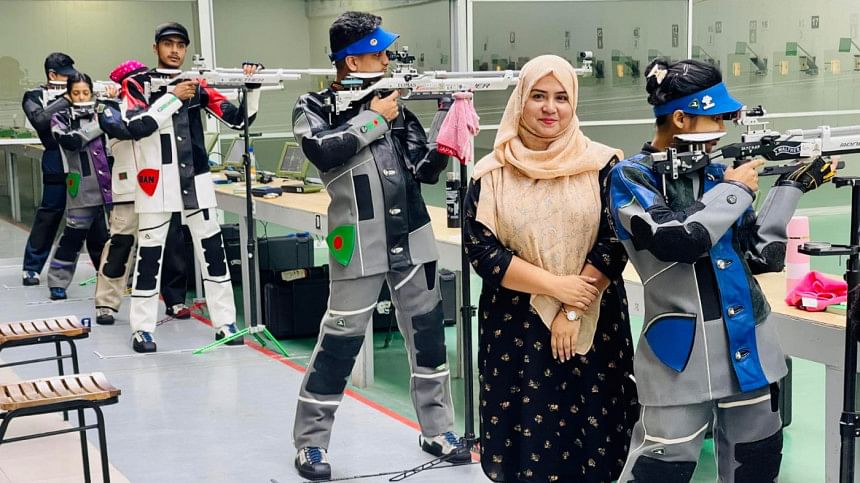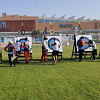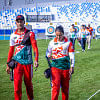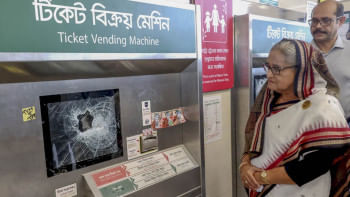'I aspire to groom better shooters than myself'

Shooter Sharmin Akter emerged champion from the open group of boys and girls in the Inter-Club Shooting Championship in 2000 when she was a sixth grader.
The BKSP student then shone in the Islamabad SA Games in 2004, bagging gold in the 10m air-rifle, before winning a silver in the next edition of the SA Games in 2006 in Sri Lanka.
Sharmin was on a roll in domestic competitions after that, becoming champion a total of five times in the national and inter-club shooting championships. After calling time on her long 22-year playing career following the 2021 Bangladesh Games completion, the 34-year-old former shooter stepped into coaching and started working as one of the three assistant coaches to the national shooting team's Iranian head coach Zaer Rezaei. In an exclusive interview with The Daily Star's Anisur Rahman, Sharmin talked about different aspects of the sport. The excerpts from the interview are as follows:
The Daily Star (DS): What inspired you to take up the coaching profession?
Sharmin Akter (SA): In shooting, we mainly depend on foreign coaches, especially for the national team. Of course, foreign coaches are good, but there is a dearth of local coaches in the sport. That's why I decided to take up coaching as a profession so that I can share my vast experience with budding shooters. And my desire is to groom better shooters than myself so that they can also hoist the national flag the way I did on foreign soil.
DS: How does the experience of your playing career help you in coaching?
SA: I had a 22-year-long career as a professional shooter and then joined coaching soon after my retirement, unlike other aspiring shooter-turn coaches. Besides, I also have vast knowledge working under different foreign coaches during my playing career, so I can use that experience and knowledge in coaching. I am also learning from the current national team's foreign coach, Mohammad Zaer Rezaei.
DS: What benefits are there for current shooters if they are coached by a former shooter?
SA: There are many. For example, there are a lot of reasons behind a bad shot rather than a single issue. As I went through this situation during my playing career, I believe I can easily find out the underlying problems at first sight better than the coaches who do not have a playing background.
DS: How prepared are you for the coaching profession?
SA: I am hundred percent prepared but there are some things in coaching such as getting introduced to the shooters, the manner of interacting and approaching them, and many other formal things which I still need to learn, even though I know about all of these a little as a former player. I completed a coaching course conducted by the federation [Bangladesh Shooting Sports Federation] but I want to complete internationally recognised courses. I was offered jobs in different sectors but to be honest, I can't think of much other than shooting and I want to continue as a shooting coach.
DS: How are the financial benefits of coaching in Bangladesh?
SA: To be honest, the salary of coaches in all disciplines is really lower than other professions in Bangladesh. That's why most male athletes rarely take up coaching as a profession after their retirement as they have to run their families. I think the range of salary for coaches in all disciplines should be increased.
DS: The female shooters, especially in 10m air-rifle events, are clearly ahead of their male teammates. How do you see this progress of female shooters in Bangladesh?
SA: I think the current bunch of female shooters are improving fast under Iranian coach Rezaei. However, the same cannot be said of the male shooters. I believe female shooters are close to winning medals in big events but they still need to improve in the coming days.
DS: Bangladesh has not seen success in shooting for a long time, barring a few sporadic achievements. What reasons do you think are behind it?
SA: We got minimal facilities in the past in shooting. Here, a shooter uses a rifle for 10 to 15 years, but the shooters overseas change rifles after one or two years. We also use shooting jackets for five to 10 years. To be honest, that was the best-case scenario for us and we tried our best to deliver. But now, the range, instruments, and other benefits in Bangladesh have developed along with a good coach appointed for the national side.

 For all latest news, follow The Daily Star's Google News channel.
For all latest news, follow The Daily Star's Google News channel. 






Comments